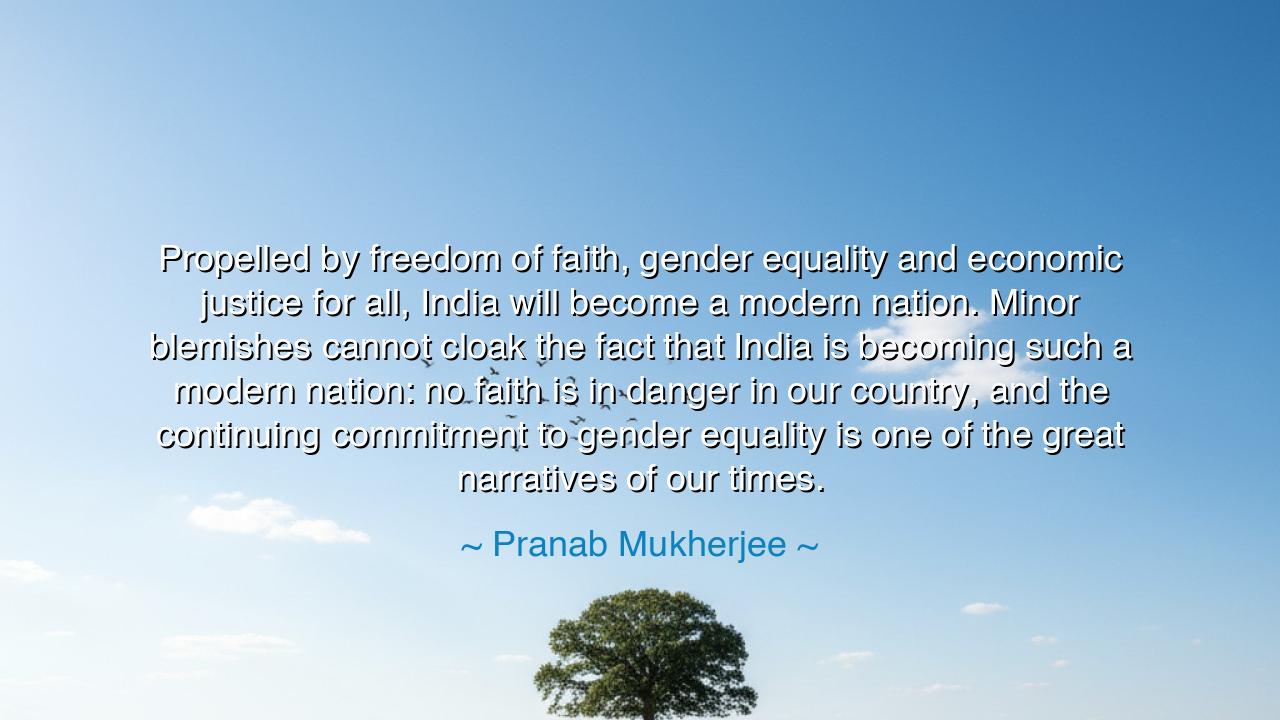
Propelled by freedom of faith, gender equality and economic
Propelled by freedom of faith, gender equality and economic justice for all, India will become a modern nation. Minor blemishes cannot cloak the fact that India is becoming such a modern nation: no faith is in danger in our country, and the continuing commitment to gender equality is one of the great narratives of our times.






In the solemn yet radiant words of Pranab Mukherjee, one of India’s most reflective statesmen: “Propelled by freedom of faith, gender equality and economic justice for all, India will become a modern nation. Minor blemishes cannot cloak the fact that India is becoming such a modern nation: no faith is in danger in our country, and the continuing commitment to gender equality is one of the great narratives of our times.” These words carry the cadence of both prophecy and remembrance. They are not the boasts of a nation already perfect, but the conviction of a people still striving—still rising—from the dust of history toward the light of destiny.
When Mukherjee spoke of freedom of faith, gender equality, and economic justice, he was not merely describing policies or social ideals—he was naming the three sacred pillars upon which the soul of modern India must stand. These are not the ornaments of civilization; they are its foundation stones. Without them, the temple of the republic would crumble, and the dreams of its founders would fade into silence. For a nation is not measured by the splendor of its palaces or the power of its armies, but by the dignity it affords every soul, regardless of creed, gender, or birth.
The origin of this vision lies deep in the soil of India’s struggle for freedom. When the great Mahatma Gandhi led his people, he did not dream of a nation bound by uniformity, but one united by diversity—a harmony of faiths, languages, and beliefs. When Pandit Nehru spoke of India’s “tryst with destiny,” he foresaw a land where science and spirit walked hand in hand, where progress was not measured in wealth alone, but in justice and compassion. Mukherjee, inheriting this legacy, spoke to remind a new generation that the true modernization of India does not lie in skyscrapers or machines, but in the awakening of its conscience.
Consider the life of Savitribai Phule, the first woman teacher of India. In the 19th century, when women were denied education, she opened schools for girls and the untouchables, facing ridicule and stones thrown at her as she walked. Yet she persisted, believing that knowledge was the truest form of liberation. Her courage was a spark in the long journey toward gender equality—a journey that Mukherjee saw continuing in his time, and which still unfolds today. Her story stands as living proof that modernity begins with moral bravery, not technology; with compassion, not conquest.
Mukherjee also spoke of the minor blemishes—the flaws, divisions, and struggles that still stain the national fabric. But his message was one of faith, not despair. He reminded his people that imperfections do not define a civilization; perseverance does. Every nation, like every individual, carries its scars. What matters is the direction of the heart. As long as India continues to honor the freedom of every faith, to uplift the dignity of every woman, and to pursue economic justice not for the few but for the many, then the journey toward true modernity will not falter.
His words are both a mirror and a map. A mirror, because they compel us to look upon our society and see both its beauty and its blemishes without illusion. A map, because they show us the road forward—a path lit by the principles of equality, inclusion, and shared prosperity. The freedom of faith ensures peace among souls; gender equality ensures balance and strength in society; economic justice ensures that no hand is left empty in the harvest of progress. When these three forces move together, a nation’s future becomes unbreakable.
So, children of India and citizens of the wider world, take heed of Mukherjee’s wisdom. Do not let cynicism dim your belief in progress. Work where you stand: defend the right of others to believe as they wish, honor the women around you as equals in spirit and strength, and build justice wherever you labor, whether in humble service or high office. Every small act of fairness, every voice raised for dignity, becomes a brick in the house of modern India.
And let this truth ring in your hearts like a temple bell: a modern nation is not born of machines, but of morality. It is not the wealth of a few, but the welfare of all, that marks its greatness. As long as India’s people guard the flame of faith, equality, and justice, no blemish—however dark—can overshadow her light.






AAdministratorAdministrator
Welcome, honored guests. Please leave a comment, we will respond soon